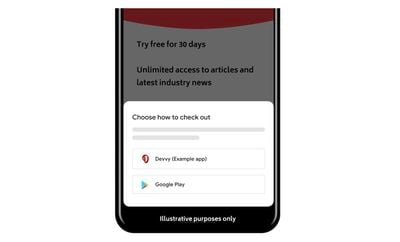The South Korean government recently passed a law that bans Apple and Google from requiring developers to use their in-app purchase systems in the App Store and Google Play respectively, and Google has now announced changes to comply with the law.

In a blog post, Google said it will be giving developers the option to add an alternative in-app billing system alongside the Play Store's billing system for Android smartphone and tablet users in South Korea. Google said the users will be able to choose which billing system to use at checkout, as seen in the example image above, and the company plans to provide developers with more details "in the coming weeks and months."
Google still plans to charge a service fee on in-app purchases completed through an alternative billing system, but it will reduce the fee by four percentage points. For the "vast majority" of developers, this means the fee will drop from 15% for transactions through Google Play's billing system to 11% for transactions through an alternate billing system.
"Like any business, we need to have a sustainable model to continue to improve our products while maintaining important user protections," said Google, in explaining why it charges a service fee on the Google Play store. "Just as it costs developers money to build an app, it costs us money to build and maintain an operating system and app store that makes those apps easily and safely accessible by consumers."
Google also warned that alternative billing systems may not offer the same security and privacy protections as Google Play's billing system.
Apple meanwhile has yet to make any changes to App Store billing in South Korea. The company previously said the law "will put users who purchase digital goods from other sources at risk of fraud, undermine their privacy protections, [and] make it difficult to manage their purchases," while making parental controls less effective.
In October, Apple told the South Korean government that it was "already in compliance with the new law and did not need to change its app store policy," according to Reuters. We've reached out to Apple for comment and we'll update this story if we hear back.




















